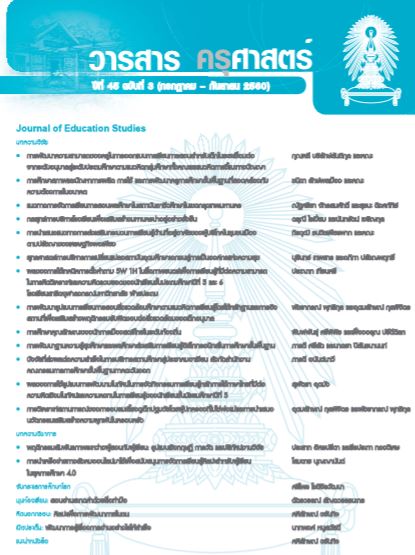การพัฒนารูปแบบการเรียนการสอนสิ่งแวดล้อมศึกษาตามแนวคิดการเรียนรู้โดยใช้หลักฐาน และการอิงสถานที่เพื่อเสริมสร้างพฤติกรรมรับผิดชอบต่อสิ่งแวดล้อมของเด็กอนุบาล
Keywords:
รูปแบบการเรียนการสอน, สิ่งแวดล้อมศึกษา, การเรียนรู้โดยใช้หลักฐาน, การเรียนรู้โดยการอิงสถานที่, พฤติกรรมรับผิดชอบต่อสิ่งแวดล้อม, INSTRUCTIONAL MODEL, ENVIRONMENTAL EDUCATION, EVIDENCE-BASED LEARNING, PLACE-BASED LEARNING, ENVIRONMENTALLY RESPONSIBLE BEHAVIORAbstract
การวิจัยมีวัตถุประสงค์เพื่อ 1) พัฒนารูปแบบการเรียนการสอนสิ่งแวดล้อมศึกษาตามแนวคิดการเรียนรู้โดยใช้หลักฐานและการอิงสถานที่ และ 2) ศึกษาผลของการใช้รูปแบบการเรียนการสอนที่พัฒนาขึ้น การดำเนินการวิจัยแบ่งเป็น 3 ระยะ คือ ระยะที่ 1 การพัฒนารูปแบบการเรียนการสอนสิ่งแวดล้อมศึกษาตามแนวคิดการเรียนรู้โดยใช้หลักฐานและการอิงสถานที่เพื่อเสริมสร้างพฤติกรรมรับผิดชอบต่อสิ่งแวดล้อมของเด็กอนุบาล ระยะที่ 2 การนำร่องรูปแบบการเรียนการสอนที่พัฒนาขึ้น และระยะที่ 3 การศึกษาผลการใช้รูปแบบการเรียนการสอนที่พัฒนาขึ้น กลุ่มตัวอย่างคือ เด็กอนุบาลปีที่ 2 จำนวน 27 คน โรงเรียนวัดประดู่ทรงธรรม จ.พระนครศรีอยุธยา ใช้เวลาทดลอง 16 สัปดาห์ เครื่องมือที่ใช้ในการเก็บรวบรวมข้อมูลคือ แบบวัดพฤติกรรม แบบประเมินพฤติกรรม และแบบบันทึกการสังเกตพฤติกรรมรับผิดชอบต่อสิ่งแวดล้อม วิเคราะห์ข้อมูลโดยการหาค่าเฉลี่ย ส่วนเบี่ยงเบนมาตรฐาน และการทดสอบค่าที ผลการวิจัยมีดังนี้ 1) รูปแบบการเรียนการสอน มี 5 ส่วน ได้แก่ หลักการ วัตถุประสงค์ สาระการเรียนรู้ ขั้นตอนการจัดการเรียนการสอน และการประเมินผล โดยมีขั้นตอนการจัดการเรียนการสอน 6 ขั้น คือ ขั้นสำรวจประเด็นปัญหาในท้องถิ่น ขั้นเชื่อมโยงประสบการณ์ ประสานพลังความคิด ขั้นสืบค้นหลักฐาน ขั้นพิทักษ์รักษาสิ่งแวดล้อม ขั้นสร้างความคิดรวบยอด และขั้นเผยแพร่ความรู้สู่สาธารณะ และ 2) ผลของการใช้รูปแบบพบว่า คะแนนเฉลี่ยพฤติกรรมรับผิดชอบต่อสิ่งแวดล้อมของกลุ่มตัวอย่างหลังการทดลองสูงกว่าคะแนนเฉลี่ยก่อนการทดลองอย่างมีนัยสำคัญทางสถิติที่ระดับ .05
The purposes of the research were 1) to develop an environmental education instructional model based on evidence - based learning and place-based learning approach for enhancing environmentally responsible behaviors of kindergarteners, and 2) to study the effectiveness of the developed instructional model on kindergarteners’ responsible behaviors. The research procedure was divided into 3 phases: 1) developing the environmental education instructional model based on evidence - based learning and place-based learning approach for enhancing environmentally responsible behavior of kindergarteners, 2) pilot studying the developed instructional model and 3) using improving studying the effects of the developed instructional model. There were 27 samples of level 2 kindergarteners from the Watpradoochongtaum School in Pranakorn Sri Ayutthaya province. Research duration took 16 weeks. Instruments for data collection were an environmentally responsible behavior test, an environmentally responsible behavior assessment and an environmentally responsible behavior observation. Arithmetic means, Standard deviations, and t-test were applied to analyze the results of the study. The research findings were as follows: 1) The developed environmental education instructional model consisted of foundation concepts, objectives, contents, operational procedures, and evaluation of the process. There were six steps of the instruction: surveying local environmental problems, connecting experiences and coordinating thinking, inquiry evidences, action on local environmental stewardship, building concept, and public presentation. 2) The result from model testing revealed that the average scores on environmentally responsible behavior of the samples after the experiment were higher than before with statistically significant differences at .05



